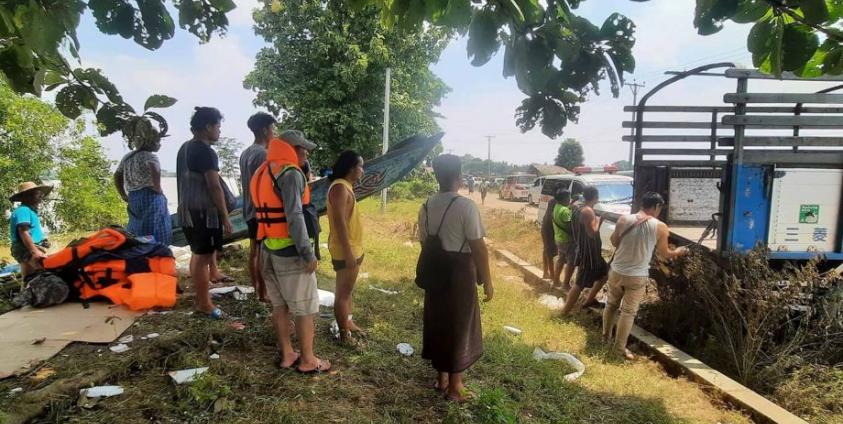Local junta-appointed authorities are preventing and restricting deliveries of aid to flood victims in downtown Taungoo and nearby villages in Taungoo Township, Bago Region.
The area has experienced severe flooding because the Sittaung River has burst its banks.
Local aid organisations and aid organisations from other Myanmar regions and states have tried to send aid to Taungoo Township, but the junta appointed local authorities are preventing their vehicles and most aid from entering the township.
Some aid groups sent up small boats that could be used to rescue people from flooded areas and to deliver aid to areas cut off by flooding, but the authorities refused to allow them into Taungoo Township.
A Taungoo Township resident said: "In the early days of the flood, only local relief organisations were helping the victims. But as the situation worsened, aid started coming from regions like Yangon, Mandalay, and Ayeyarwady. There are no boats in Taungoo, so some donors brought boats on trucks. However, the authorities didn’t allow them [into Taungoo Township], so the donors had to take them back. The authorities also restricted the transport of other types of aid to Taungoo.”
The tail end of Typhoon Yagi caused heavy rains across Myanmar during September. The rain caused surges in the Sittaung River which caused flooding on both banks, including in downtown Taungoo Town. Despite urgent rescue efforts there are still people who remain trapped in inaccessible villages that aid workers have not yet been able to reach.
It is believed that around 100 households in Innwaing and Kayinchaung villages in Taungoo Township are still trapped due to floodwaters. Some villages at the bottom of hills in nearby Htantabin Township, in Taungoo District, have also not yet received assistance and are in urgent need of medicine, food and water, according to a young aid worker familiar with the situation.
Explaining how the junta authorities are preventing aid from reaching villages in need by restricting the size of aid deliveries he said: "They mainly need food and medicine. We want to go to these villages to help, but we are facing obstacles and sometimes can't get permission. Aid materials intended for the other side of the Sittaung River are strictly checked and [we are] questioned about its destinations at local checkpoints. We are permitted to carry only a small amount after compromising with the authorities, while most of the rest [of the aid] is not allowed to be transported. That's why we can't deliver a larger amount of aid.”
He also explained that though the floodwaters have started receding in Taungoo Township it might still take months for all the water to disappear because the only way that water can leave the area is by draining into the Sittaung RIver.
Though there has been an adequate amount of food aid for flood victims who can be reached, a lot of help is required with rebuilding work, which is now starting. But, it is being hampered by the junta's travel restrictions which have resulted in stockpiles of building materials collecting in villages around Taungoo Town, because the junta is not allowing the materials to be distributed to the areas where it is urgently needed.
To make matters worse for victims, thieves are operating in Taungoo Township and stealing valuables from flooded houses that have been vacated by their owners, according to locals.
Some areas of Taungoo Town and several nearby villages were already previously flooded at the end of August 2024 when the junta released excess water from the Ngalaik Dam in Pyinmana Township and the Swar Dam in Yedashe Township. About 5,000 people were affected that time, but only a week after those floodwaters receded the tail end of Typhoon Yagi Struck and caused the current flooding, which is considerably worse and more widespread.
Typhoon Yagi, the most powerful storm to hit Asia so far this year, made landfall in northern Vietnam on 7 September 2024. On 8 September it was downgraded to a tropical depression before first hitting eastern and central regions of Myanmar on 10 September as heavy rainfall. It has affected Shan, Mon, Karen, and Karenni states, as well as Bago, Sagaing and Magway regions and areas around the capital Naypyidaw. The resulting flooding and landslides have impacted about 600,000 and caused hundreds of casualties across Myanmar.








